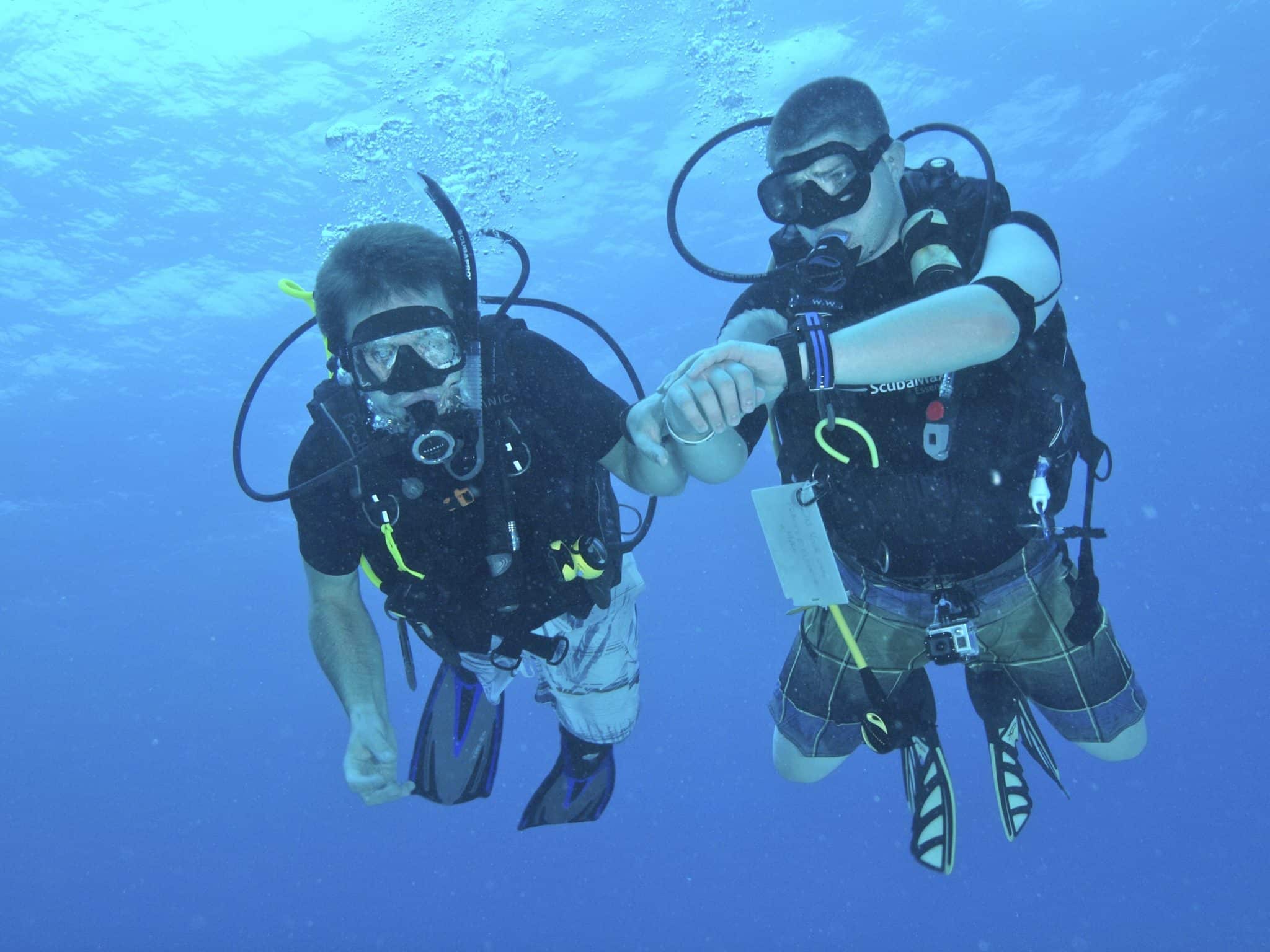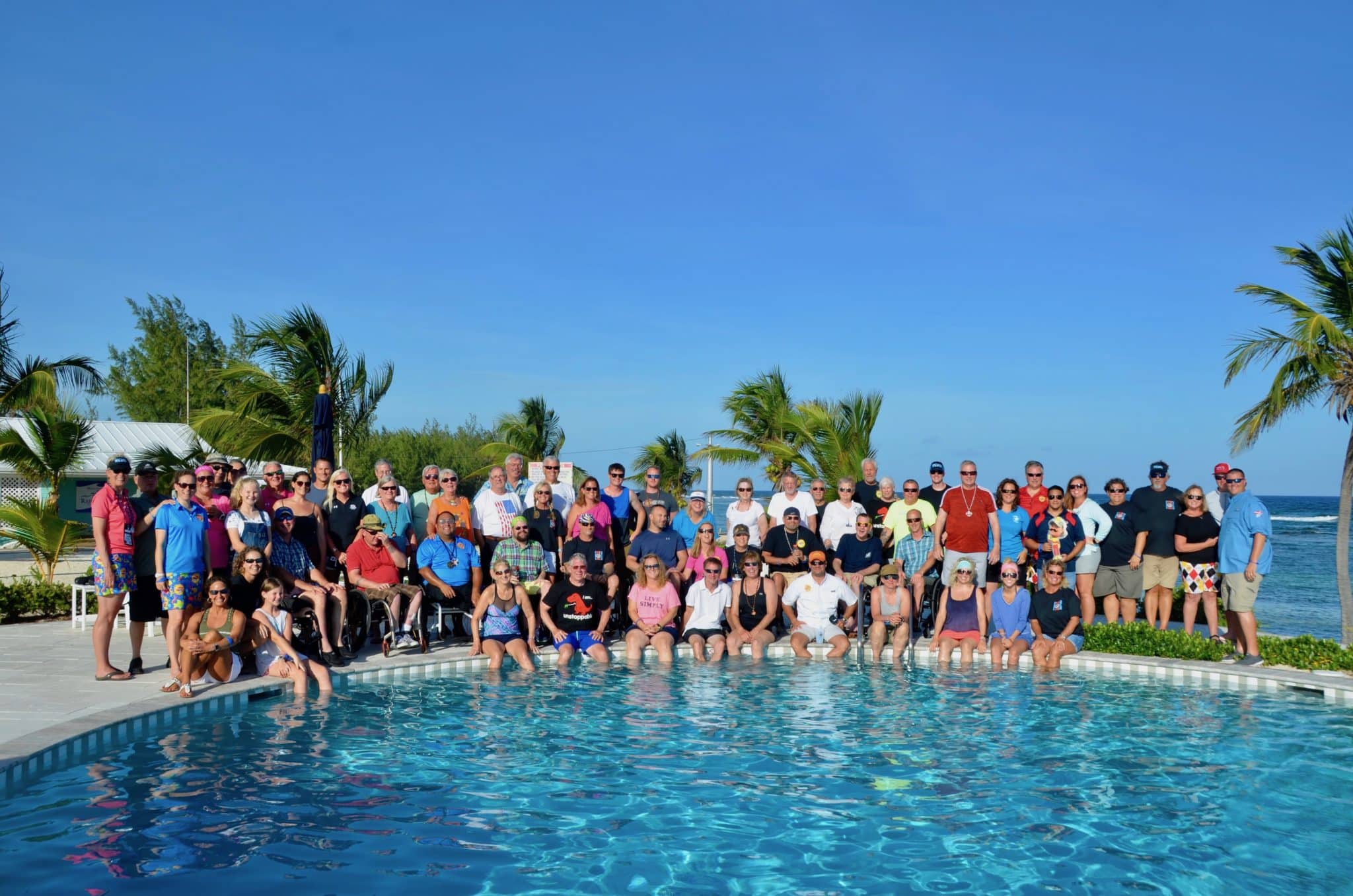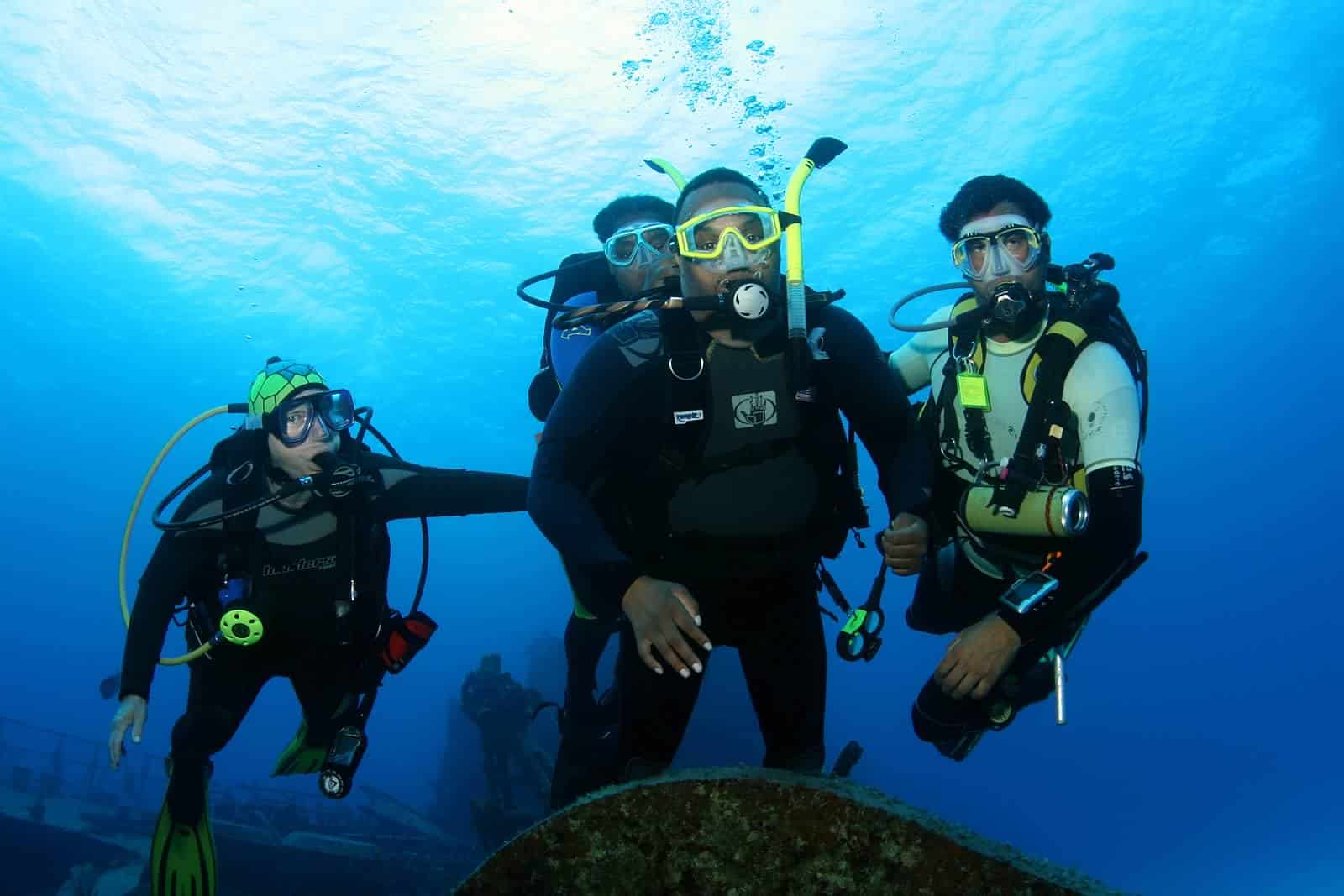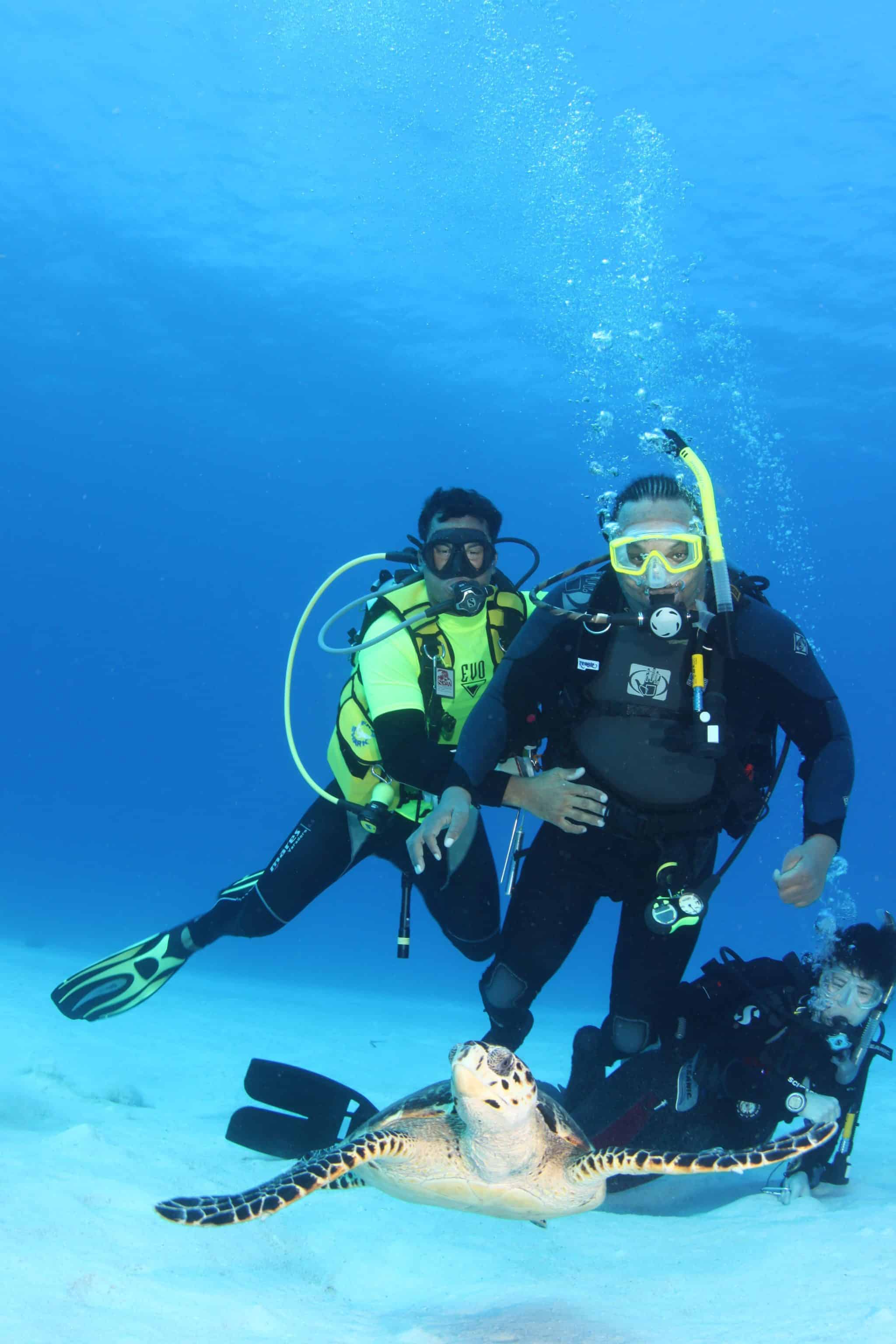Editor’s Note: Have you ever dreamt of plunging off the edge of a boat into crystal clear waters and exploring the underwater world, yet felt it was something you’d never be able to experience due to your disability? Well, guess what? Thanks to Dive Pirates, people with mobile disabilities CAN learn to scuba dive. And guess what else? They want to help you become a certified adaptive diver and take you on a trip to the Caribbean! Wheel:Life writer Betsy Bailey chatted with Dive Pirates Director of Communications Theresa Cortez about what they do, why they do it, and how to get involved.

Dive Pirates was founded by three women who had learned how to teach people with disabilities to scuba dive. The women decided they wanted to share what they had learned, so they found a few wounded Veterans interested in scuba diving, taught them the necessary adaptive techniques, and then took them diving. Everyone had such a great time on that trip that they wanted to do it again. From that point on, Dive Pirates began to build momentum and soon after became a foundation and 501(c)(3) nonprofit.
We focus on people with mobile disabilities and our injured military; however, we're not exclusive to that. We welcome anyone with a mobile disability who would like to scuba dive to apply to our program.
We love diving because it's a recreational sport that you can enjoy with adaptive and non-adaptive divers.
It's not as exclusive as wheelchair basketball or any other adaptive sport with only adaptive participants. Diving is something you can do on vacation with your family and friends, and the community is very welcoming. We love the inclusiveness of it.

As long as someone can clear a mask and their pulmonary function is strong enough to breathe with a scuba tank, they can be considered for the program. We've had divers who are quadriplegics that have quite limited mobility, but with the correct training and a team around that person, it is possible. Whether we can accept an applicant or not really comes down to the medical evaluation and if their doctor feels they are capable of operating the breathing apparatus. The applicant must also have the cognitive ability to go through the training. Working with the medical community has been a great asset, and we even have some people with medical backgrounds on our board who help advise.
We understand that the water is such a gift of freedom for people with mobile disabilities.
Editor’s Note: What does it mean to “clear a mask,” you ask? Check out this video from ScubaDiving.com.

We have an online application system on DivePirates.org. In order to complete the application process, we need a full medical history and a release from their doctor to make sure they're safe to start training. Once they finish all the paperwork online and are accepted into the program, we visit with them and check to see if we have an associated dive center near them. Dive Pirates works through the grace and generosity of dive centers throughout the nation. We have about 42 chapters in the United States and four in Australia. All of these centers have an adaptive instructor and are willing to open their doors to the adaptive community. We appreciate that network who works with us, understands our program, holds fundraisers at their dive centers, and welcomes our divers into their community.
When someone is accepted into our program, we also hope they have somebody in mind to be their adaptive buddy. Anytime anyone goes diving, whether they’re an adaptive diver or not, it's important to have a buddy come along. In the adaptive world, a diver should have a trained adaptive buddy, or maybe even two, depending on that person’s abilities and needs. Some adaptive divers are able to do many of the core skills, but for the elements they need assistance with, their buddy helps fill in those gaps to ensure the diver is safe.
The adaptive community deals with this kind of scenario every day. Maybe someone can’t turn a doorknob the traditional way, but they're able to figure out another way to open the door or find someone to help them do it. It's all about working around whatever challenges are present.
There's always a way; you just have to think it through.
We appreciate that our adaptive divers are used to making changes in order to get things done in everyday life. They understand, especially when we leave the country, that not everything is ADA compliant, and we may have to make adjustments.

There are some basic costs that each diver has to incur such as making sure they have a passport, obtaining divers insurance, and travel spending money. Through scholarships and grants, we’re able to fully cover the costs of equipment for our divers and their buddies, which costs around $1500 per person. It's their personal equipment that they get to go home with. We also work with each recipient to get their equipment customized to fit their needs. We make sure they're well suited so they can continue diving past their experience with Dive Pirates. We also pay for their training and coordinate it with the dive center. Throughout their training, we ask our divers to have some skin in the game and help raise around $2500 to cover the resort costs and diving fees.
Once we introduce a recipient to their dive chapter and their community, we work with that center's scheduling and get our diver started with classroom work online. When they're ready, they start training in the pool. The pool sessions can span a few weekends or more depending on their needs. To become certified, participants need to do an open water dive. Depending on their location, there may not be a lot of local diving opportunities. In that case, we complete the open water dive on our trip. We coordinate everything to make sure they've had the necessary training to become a certified adaptive diver.
For adaptive divers, the certification states a rating level depending on how much assistance they need. If they choose to continue diving after their experience with Dive Pirates, a dive operator can review their certification card and determine if they are capable of accommodating them accordingly. When planning future dive trips, adaptive divers should discuss their certification with the dive operator to decide if the location is right for them.
At least once a year, we take a trip. We bring as many recipients as we have funding for that have completed their training. So far, we've had about 120 adaptive divers come through our program in 14 years. That’s not counting their adaptive buddies.
Traditionally, we go to Cayman Brac Beach Resort which is located in the Cayman Islands. The resort has been incredible in accommodating our divers, and their dive operator, Reef Divers, has welcomed us with open arms. That's always been our home base, a place we know we can take our adaptive divers and have an incredible and safe experience.

The weeklong trip is such a joy. I remember one recipient saying, "I feel like I'm at summer camp!" It really is a week of fun and camaraderie.
Diving may be the function, but the family atmosphere truly becomes the focus.
When we go to Cayman Brac, we take over the whole resort. We have anywhere from 70 to 80 travelers with us, 15 to 20 of which are new adaptive divers. People who have been through the program sometimes return the following year with other family members because they want to continue diving, and they want to do it with like-minded people. It's a great vacation trip for a lot of families and volunteers.
There are small things that have stuck with me over the past 15 years. One time after training, a recipient came up to me and said, "I couldn't get out of the pool!" My first thought was that something went wrong, but then he said, "I feel like a little kid. I just didn't want to get out of the pool!"
I've also heard recipients talk about finding peace underneath the water and feeling like they were flying or swimming on their own. Diving gets them out of their wheelchair and out of their everyday reality.
For many divers, it relieves the pressure and pain they experience from being in a chair.
Everyone has a different perspective on why they dive. We focus on our injured military, but that’s not a requirement. It’s usually a balance of about half military, half civilians. We have people who were injured in car accidents to divers with birth defects; it’s really the whole spectrum. Our military people tend to appreciate that and have expressed that it helps them meet others in the disability community. The combination of military and civilian participants has made for a very cohesive family group. That's something we didn't create; they did.

The only way Dive Pirates can function is through the generosity of others. If someone would like to donate to the foundation, we just released Auto Pirate where they can choose an amount to be automatically charged to their debit or credit card each month. We also have yearly memberships and various fundraising events. Another way to give is to volunteer through a local chapter.
When we think of pirates, we have these images in our heads of peg legs, hand hooks, and eyepatches. Pirates embraced their entire crew. They held their crew members close and their injured closer.
They had a culture of respecting those who were injured in battle or had anything else that affected their mobility.
They kept them as members of the crew and found jobs for them so they could contribute. They shared the treasure booty with them. We see the treasure of the Caribbean and underwater world as a gift. Dive Pirates wants to hold that crew close to our hearts and share that booty with them.
Editor’s Note: Further details on Dive Pirates Foundation and how to apply to the program can be found at DivePirates.org. For more incredible underwater photos, check out @divepriates on Facebook.
All information contained in this article was extracted from an interview with Theresa Cortez, DivePirates.org, and ScubaDiving.com.
About the Author
Betsy Bailey has a diverse background including experience in marketing research at American Express, business operations and client relations with 601am, travel and culinary writing with VegDining, and playing volleyball professionally overseas.
Betsy has been writing for Wheel:Life since January of 2017 and thoroughly enjoys the process of getting to know her interviewees. She also teaches students learning English as a second language, speaks French fluently, and travels any chance she gets!